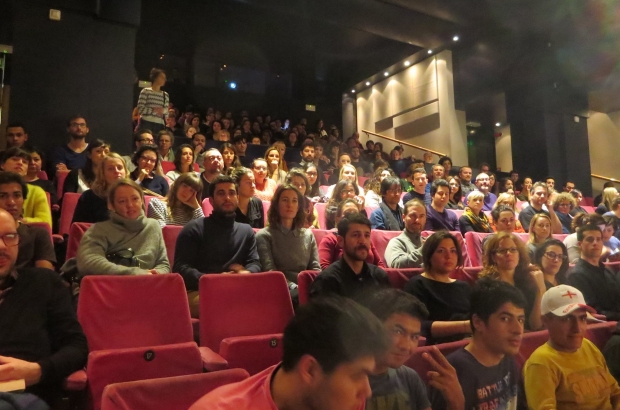- Daily & Weekly newsletters
- Buy & download The Bulletin
- Comment on our articles
Pop-up cinema project brings refugees and locals together
Starting with just a projector and a screen under a tent in Brussels’ Maximiliaan Park, Cinemaximiliaan is expanding its activities throughout Belgium and internationally, with sub-groups emerging in Antwerp, Ghent, Hasselt and Liège.
Described by its creators Gawan Fagard and Gwendolyn Lootens as “a pop-up cinema for and with people on the move”, Cinemaximiliaan travels to remote asylum centres, offering film screenings, art exhibitions and museum visits to the centres residents. It is currently hosting, for example, a show at Hasselt’s Z33 arts centre featuring 21 artists, including four refugees.
Fagard, 30, says that film and art will remain key “because that makes up our professional background and is also our passion. Now many volunteers and arts institutions support us”. Projects coming up include the 2 May premiere of Syrian film The Emigrants at Bozar, with a discussion and master class.
Cinemaximiliaan also stars in next month’s kick-off of the annual Brussels arts festival Kunstenfestivaldesarts, organising a debate on Egyptian artist Wael Shawky’s video trilogy Cabaret Crusades. Later in the month, Cinemaximiliaan hosts “an evening of dance and music from Syria, Iraq and Palestine,” says Fagard.
Creative collaborations
Cinemaximiliaan is particularly big in Flanders, he continues, with regular film screenings in asylum centres in Sint-Niklaas, Ghent, Lombardsijde, Broechem, Houthalen-Helchteren, Hechtel-Eksel and Lubbeek.
“From there, many other projects have emerged, like visiting Ghent’s contemporary art museum SMAK and taking part in Ghent’s Courtisane and Turnhout’s MOOOV film festivals,” Fagard says. “We also spearhead educational programmes for schools and newcomers in Hasselt and Antwerp.”
The project further collaborates with art house cinemas and schools, including Zebra cinema in Hasselt and the OFFOff series of screenings at Ghent’s school of arts to make “less mainstream programme choices,” explains Fagard. “We’ve discovered that many newcomers have rarely seen films from their own countries. So we’re trying to show Middle Eastern as well as classic Syrian films. Evenings include a space for debate, as these films often talk about the region’s problems.”
Fagard, an art historian from Sint-Niklaas, and Ghent visual artist Lootens, 34, previously collaborated on the Brussels Wolke project for creatives, which ended last year. When the refugee crisis escalated last summer, they decided to launch Cinemaximiliaan at the camp that sprouted up in Brussels’ city farm, the Maximiliaan Park.
Starting small, Cinemaximiliaan now involves a large community of people dispersed in asylum centres all over the country. “It is important to keep it fluid, but Cinemaximiliaan can only grow, as unfortunately more and more people will be forced by the hardships in some parts of the world to come here,” says Fagard. “Our activities will probably shift according to the ever-changing needs of newcomers.”
“A big family”
People on the run, he continues, “have often been through very harsh and difficult conditions and, once they arrive in Belgium, waiting for their papers is very stressful. We aim to give them a moment to escape this hard reality by watching films or visiting an exhibition – sharing a good time. We don’t just work for refugees; we work with them.”
In the future, he says, “we hope the people who took part in our programmes can help others to find their way, and that, in 10 years’ time, Cinemaximiliaan will be a big family”.
With an ever-changing team involving many volunteers, Cinemaximiliaan have always wanted to stay “as non-bureaucratic as possible,” Fagard says. But after nearly six months without institutional or financial support, it has now become an official non-profit organisation, thanks to a crowdfunding campaign and funding from foundations like the Goethe Institute.
“We are looking into finding more structured funding to keep the platform financially healthy,” Fagard concludes, adding hopefully: “Ideas, information and help are always welcome.”
Photo courtesy Cinemaximiliaan









